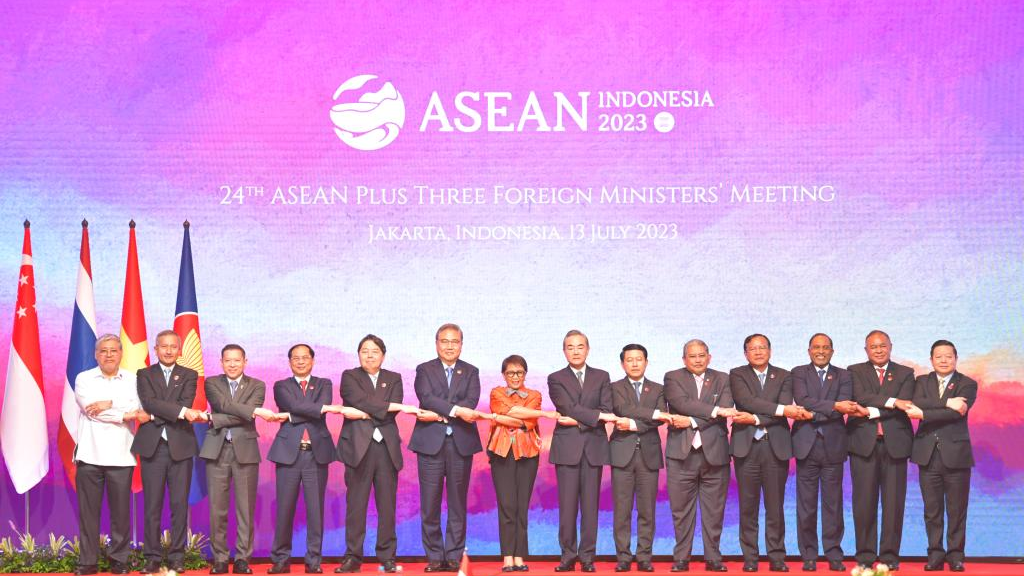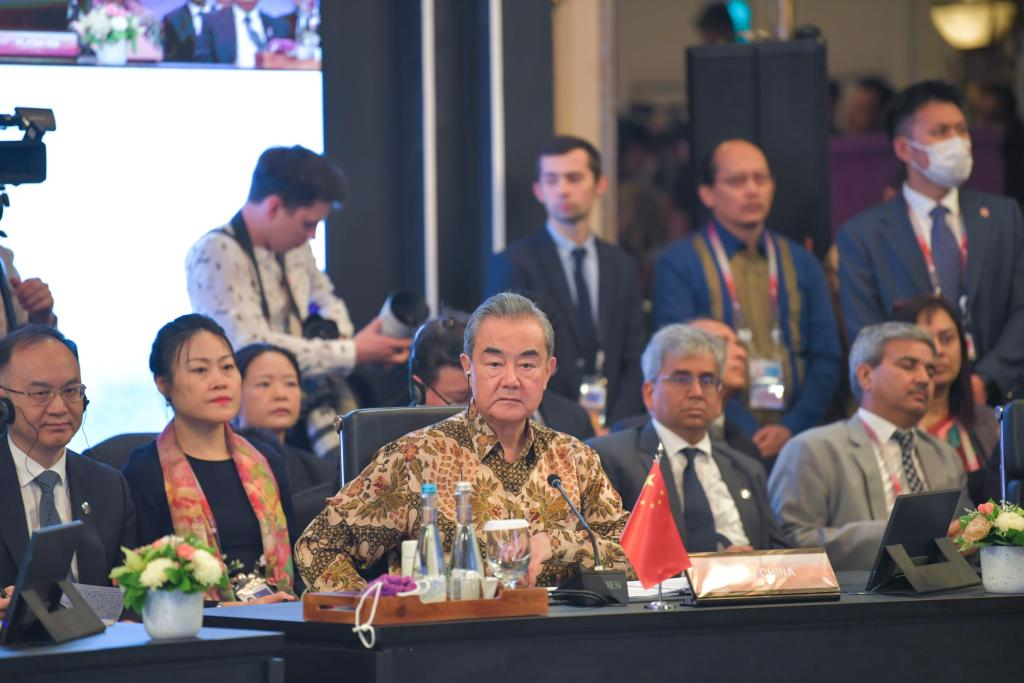
Director of the Office of the Central Commission for Foreign Affairs Wang Yi (7th R) attends the ASEAN Plus Three (APT) Foreign Ministers' Meeting in Jakarta, Indonesia, July 13, 2023. [Photo/Xinhua]
By Emilia Fernandez
Wang Yi, director of the Office of the Central Commission for Foreign Affairs, has just completed a series of meetings with foreign ministers of the Association of Southeast Asian Nations (ASEAN) in Jakarta.
Unlike every year, this year's meetings carry special value as it marks the 20th anniversary of China's accession to the Treaty of Amity and Cooperation in Southeast Asia (TAC), a decade of Chinese President Xi Jinping's proposal of collective efforts with ASEAN to build a Maritime Silk Road and build a more closely-knit China-ASEAN community of shared destiny. As Sino-ASEAN ties are marked by a delicate balance of economic engagements, geopolitical complexities, and occasional tensions, it is high time to delve into Wang's remarks at the ASEAN summit to decode the implications for regional and global peace and progress.
While attending ASEAN-China Foreign Ministers' meeting, Wang praised both sides' wholehearted implementation of the purposes and principles of TAC, a diplomatic agreement that promotes peaceful coexistence, regional stability, and multilateral cooperation among its signatories. China was the first among major nations to join the TAC and establish a strategic partnership with ASEAN. Because of this inter-state framework, China and ASEAN have emphasized peaceful settlements of disputes and non-interference in internal affairs in the last two decades.
Economically, China and ASEAN are each other's largest trading partners with trade volume expected to cross $1 trillion this year, according to Wang. Noteworthy, China has become the fourth-largest source of Foreign Direct Investment in ASEAN states. Wang transmitted a positive signal for strengthening commercial ties by urging that China and ASEAN should expedite negotiations on the upgrade of the China-ASEAN Free Trade Area and full-fledged implementation of the Regional Comprehensive Economic Partnership. Undoubtedly, ensuring free trade and open markets can usher new avenues to take Sino-ASEAN bonds to new heights.
In his remarks, Wang mentioned that China has reached a crucial consensus with the ASEAN members to work together on building a community with a shared future. Their joint effort to pursue shared goals by transcending national interests is required to address common global challenges, ensure regional stability, boost economic progress, and facilitate humanitarian, technical, and development assistance.

Director of the Office of the Central Commission for Foreign Affairs Wang Yi (Front) attends the 13th East Asia Summit Foreign Ministers' Meeting in Jakarta, Indonesia, July 14, 2023. [Photo/Xinhua]
The diplomat also mentioned the success of the Belt and Road Initiative (BRI) in completing landmark projects in ASEAN while bringing tangible benefits to more than 2 billion people. The BRI is expected to contribute to more economic integration, trade and investment expansion, enhanced connectivity, increased people-to-people contact, and cultural exchange among ASEAN members.
Wang agreed to accelerate negotiations for the Code of Conduct in the South China Sea, welcomed the completion of its second reading, and committed to play a constructive role in its early conclusion. Not to mention, this thorny issue often strains the relations between China and ASEAN. Though they have brought the situation under control, external forces have been trying to use ASEAN as a proxy in great power rivalry centering on the South China Sea issue. China and ASEAN should not allow this issue to become a stumbling block in their diplomatic engagement. Moreover, Wang highlighted China's active participation and firm support for the ASEAN-centered regional cooperation architecture and will keep inclusively supporting its continued development without any interference.
ASEAN has long been pursuing a policy of engaging China while ensuring unity among its diverse members. ASEAN leaders understand that ensuring "centrality" depends largely on the effective engagement of China, the world's second-largest economy and major power. On the other hand, China has always been an advocate for ASEAN's centrality, unity, and community building in regional cooperation and actively participated in various ASEAN-led regional mechanisms.
ASEAN's emergence as an influential regional bloc and China's rise as a global economic powerhouse provides their partnership the potential to shape the political, economic, and security landscape of the Asia-Pacific region. Despite challenges in ASEAN-China ties that demand careful navigation, there is a glimmer of hope for a prosperous future built on mutual respect and shared aspirations. Only through cooperation, they can unlock the true potential of their partnership and emerge as drivers of stability, peace, and prosperity in the region.
Throughout this summit, Wang reminded ASEAN and other global powers of their joint responsibilities in upholding the ASEAN's centrality, addressing common global challenges, safeguarding the global free trade system, and promoting true multilateralism.
Emilia Fernandez, a special commentator for CGTN, is a security and political analyst with a focus on South Asian geopolitics, and PhD researcher at the University of Lucerne, Switzerland.

 中文
中文



